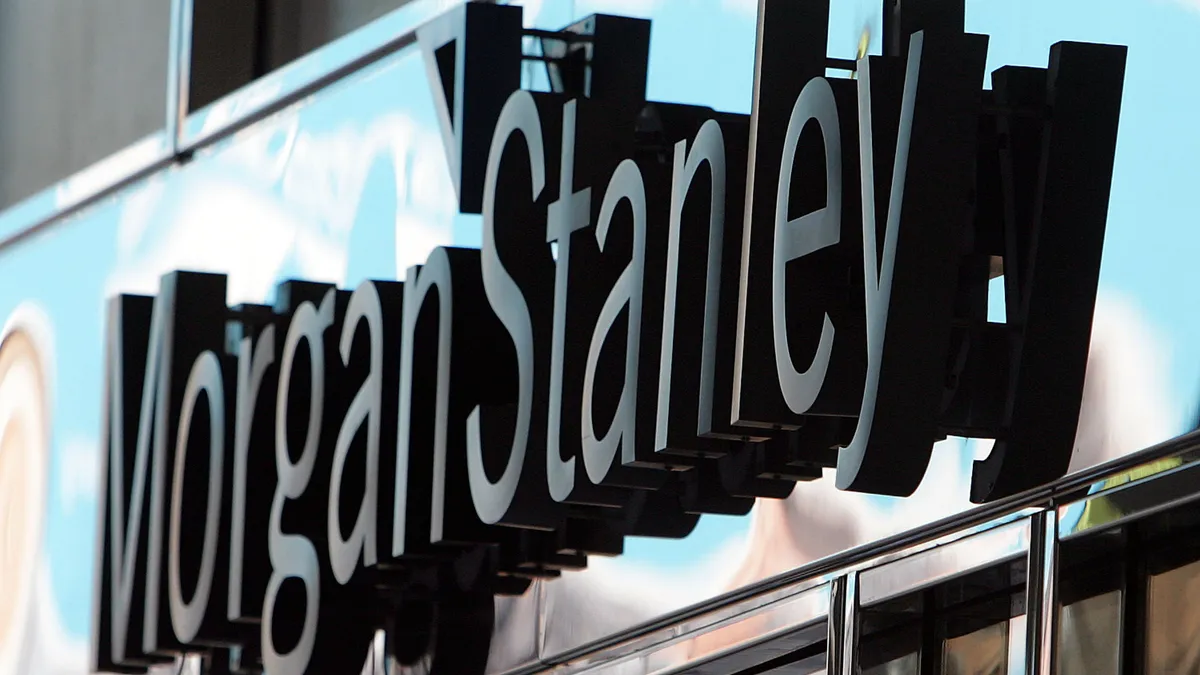Morgan Stanley and Capital One appear to be among the latest banks to de-emphasize mentions of diversity, equity and inclusion in their annual Securities and Exchange Commission filings.
This year’s annual filing from Morgan Stanley, posted Friday, does not feature the subheading “Diversity and Inclusion,” where the report from a year ago did.
Both versions, in the introduction to the bank’s “Human Capital” section, feature the sentence: “To facilitate talent attraction and retention, we strive to make Morgan Stanley a diverse and inclusive workplace with a strong culture and opportunities for our employees to grow and develop in their career.”
But where the February 2024 document contained a paragraph that calls attention to the bank’s Institute for Inclusion, the 2025 filing’s comparable paragraph begins with a mention of meritocracy – a buzzword of sorts amid the Trump-era crackdown on DEI. The title of President Donald Trump’s executive order to end what he terms “illegal” DEI favors instead “merit-based opportunity.”
“Meritocracy is at the heart of Morgan Stanley’s talent development,” the bank wrote in Friday’s filing. “We believe a workforce that represents the societies in which we live and work, and our global client base, is integral to Morgan Stanley’s continued success.”
It does, however, tout that Morgan Stanley “believe[s] that an inclusive workplace is in the best interests of our employees and clients.” By comparison, last year’s DEI paragraph begins: “We believe a diverse and inclusive workforce is important to Morgan Stanley’s continued success and our ability to serve our clients.”
Both versions contain a breakdown of representation indicating that 40% of the bank’s employees are women and 35% of its U.S. workforce is ethnically diverse. Meanwhile, 29% of Morgan Stanley’s officers are women, and 28% of U.S. officers are ethnically diverse, the bank said.
In Capital One’s case, the entire section labeled “Diversity, Inclusion and Belonging” in 2024’s filing is absent from the 2025 version, filed Thursday.
Further, while both years’ filings stress that “pay equity is an important element of our pay philosophy,” the statement, in 2024’s filing that Capital One pays women “100% of what men are paid” and U.S.-based racially and ethnically diverse associates “100% of what white associates are paid” – according to the bank’s own analysis of aggregated adjusted pay gap results – does not appear in Thursday’s.
Morgan Stanley and Capital One are hardly the only banks to adjust their DEI language in the wake of the power shift in Washington.
Citi on Thursday told its employees that, amid pressure from the Trump administration, it is dropping “aspirational representation goals,” except where required by local laws, according to a memo posted on the company’s website. The bank is also scrapping a policy that mandates diverse rosters of candidates for job interviews, it said.
“It is important to note that we’re living in an environment where things are changing quickly,” CEO Jane Fraser wrote in the memo. “The recent changes in U.S. federal government policy, including new requirements that apply to all federal contractors, call for changes to some of the global strategies and programs we’ve used to attract and support colleagues from various backgrounds.”
In JPMorgan Chase’s annual regulatory filing Feb. 14, the bank said it “has been and expects that it will continue to be criticized by activists, politicians and other members of the public concerning business practices or positions” it’s taken “with respect to matters of public policy (such as diversity, equity and inclusion initiatives).”
The bank did, however, assert “that its long-term growth and success depend on its ability to attract, develop and retain talented employees and foster an inclusive work environment.”
But JPMorgan CEO Jamie Dimon this month said the bank would reduce spending on some DEI efforts, not due to the White House’s orders but because he views them as wasteful, according to Bloomberg.
“I was never a firm believer in bias training,” Dimon said at a company town hall, according to Bloomberg. “I saw how we were spending money on some of this stupid sh-t, and it really pissed me off.”
JPMorgan, in its 2024 filing, highlighted its “global Diversity, Equity & Inclusion centers of excellence” that “support its diversity, equity and inclusion strategies through initiatives such as career coaching and mentorship.” Further, a table breaking down the bank’s proportion of diverse workers that was titled “Diversity, equity and inclusion” last year was labeled “Workforce composition” in the Feb. 14 filing.






















